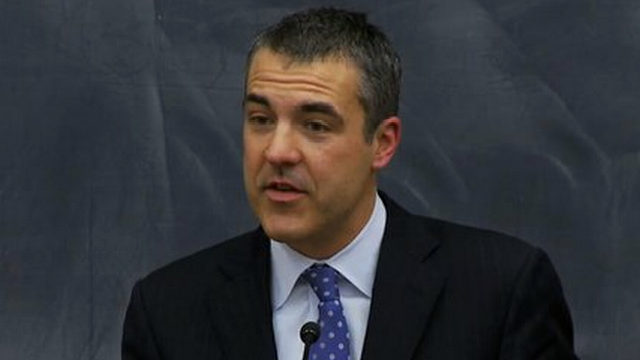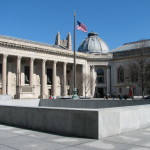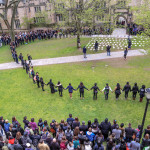by Marina Tinone
Professor John Witt (TD 94, LAW 99, GSAS 00) is the head of the Committee to Establish Principles on Renaming (CEPR). On October 4, I sat across from Professor Witt in his office at the Sterling Law Building. Surrounded by his full shelves of law and history books, I spoke with the law and history professor about his prior and current involvement, plans for the CEPR, as well as his experiences on the Residential College Listening Tour. At the time of the interview, he had just finished a conversation with six of the twelve residential colleges. I began the conversation by asking about his approach to the issue, beginning from the events last year:
What did you learn from your students [involved with last year’s events]?
I was reminded how energetic and inspirational the students are. Our students… took this issue really seriously. I remember, we had an exchange… [that] I think historians of all ideological stripes have been reluctant to do because the historian doesn’t want to erase the past, historians want to live off the past, wants to revel in and figure out and make sense of it. And we are about the moralizations, and so I shared those concerns [with my law students] a year ago, [and] I heard really interesting arguments back. Arguments about trying to make sure… the way in which you might distinguish between someone’s principal contributions to the world… on the one hand, and on the things that are known for on the one hand as compared to people who are just engaged in practices, people who engaged in practices that were ordinary, and give them time and place. And that was a really valuable distinction for me. I guess quietly, I’ve been thinking what the principles would be for a while.
As a history professor, and as a law professor, how do those two sides of you approach the committee’s task?
The historian in me likes learning about the past and the past is a bunch of different ways that it shows up so we can think about the pasts of the namesakes themselves, and there are a bunch of names on buildings all over campus. And their histories are interesting, sometimes troubling, sometimes daunting, more embracing, and sometimes inspiring.
The lawyer side of me likes thinking about trying to develop rules and trying to develop governing structures which I think are really important for helping people move forward together. And it turns out that that’s what governing structures and rules are all about. It’s about managing disagreement in communities. There is disagreement about these naming things so I start with the idea that legal training and legal institutions offer some pretty valuable lessons for thinking about governing structures and processes and how to move forward.
As the committee is in the early stages of deliberation, are there any recurring themes of tension or agreement within the committee?
Our committee discussions, we’ve decided to keep confidential. We think it’s really important to deliberate freely and openly and within that really critical process. What we really have done is study a lot of cases, and we’ve brought in guests from places, university leaders of other places, that have dealt with similar kinds of controversies and have studies a lot. They have interesting things in common in those conversations.
One of the things that seems pretty clear is that most of the institutions that have engaged in renaming have faced questions about buildings that have significantly less place in the tradition of the university… And so one of the things with these cases, there’s a reason why the issue has been so protracted here on this campus, is that the name Calhoun is a name that has both become important to generations of students that haven’t associated in any particular person, but who have developed university identities around it… That just makes it a [graver] problem for [the] campus. On the other side, campuses have been engaged in renamings, and survived, and found ways to make sure that their renamings don’t involve erasing history. That’s been a really, really clear theme throughout: some places that have done renaming, and some places that have kept old names, have used these occasions to bring out information, to fulfill the mission of the university, which is to produce knowledge, not suppress it. So that’s been a really serious theme in all the cases we’ve studied, and I don’t think we’re speaking out of school when I say we’re taking this really seriously.
Just to backtrack a bit — what motivated you to become involved in this committee?
People have asked me, oftentimes… and say “what on earth led you to do this?” You know, I spent a lot of time with Yale. I was an undergraduate here, a law student here, I was a graduate student here, and I’ve come back, for seven years, on the faculty, and that’s a long time! The institution really means a lot to me. I’ve become an adult and a professional here. I love this place. And that’s been one of the most inspiring pieces of this work, is that when you go around and talk to people all over the campus, people who are upset about where we are, and people who don’t care about where we are, the whole array of people, we’ve heard so many expressions of affection for this place. So many people have good will towards getting this into a good spot. I got involved because it seemed there was an opportunity to help move this process to a better resting place. These kinds of controversies are never going to go away. It’s actually important that we talk about our collective values. We wouldn’t want for conversations about how we present ourselves to go away. That would signal a mistake… But I think that there can be resting places in the conversation and it might be valuable to try and get us there.
Who’s involved in the conversation? What is the scope of this conversation, and how can people participate?
One of the principal places we’re looking for feedback is on our website, and the website is open to everyone. There are opportunities to mark off affiliation with the university, and one of those things is no affiliation with the university. I’ve gotten emails from members of the New Haven community just from the website, I’ve gotten emails from members of the New Haven community with no connection to Yale, I’ve gotten messages on the website from people from southern California and Texas with no connection to the university. So it really is open to everybody. We really do read everything that comes in. I have tried to reply to everyone. I’m a little bit out of date, [so by the time the piece is published] there will be people who haven’t gotten a response from me, but it’s because there have been a really rewarding number of emails. And my responses have not been to a form, they’ve been tailored, to show people that we are reading these emails. So that mechanism is a great mechanism to give us input and it’s open to everybody. We’ve gotten great ideas, and every time I read a message on our problem, I really am able to understand a new facet of it. That is open to everybody, and has been really useful.
We have reached out to alums through the Association of the Alumni in an effort to get them to use that device to tell us what they think, and that’s been successful. We have the residential college outreach, we have similar outreach programs for the graduate and professional schools, and we have outreach programs for the staff… Our committee is helping to spearhead meeting with a group called the Facilities and Dining Hall Leads. This is a position to figure out how we can best reach out to Facilities and Dining Hall workers. So the goal is to give as many people as possible a path to provide the kind of input. I’m really glad right now there are no obstacles to that. No matter what, anyone can reach out to us. We’re trying to do our best.
The conversations [at the residential colleges are] great. I mean, they have shown seriousness of which the students have come and taken the issue. There have been some students who were frustrated, and I understand that, having talked about this for a long time, more than a year now, can lead to frustration, and I get that, and we’re not in a position to allay that frustration, but we can do our best to hear it and to hear ideas alongside it and respect it. We get new ideas from these conversations. I mean, just the other day at Berkeley, a student, I forget his year, had a really interesting suggestion that I hadn’t heard anywhere else before. He wondered whether college’s buildings had to have the same name as the colleges. That is to say, this is Yale Law School, but it’s the Sterling Law Building at Yale Law School. So this idea was, you can have the same separation in residential colleges. This is not to say that we’re going to seize on that as the solution; we haven’t shared this view with committee yet, but people have really creative, interesting ideas, which help us understand our problem.
I have no doubt that we’ll issue a report sometime around the end of the semester, we can’t be too fixed, because the work has to be done right. So that’s the most important thing. We’ll issue a report hopefully sometime during the end of the semester, and I’m sure, when we do that, there will be people who disagree with the things they say. There’s just no doubt about that. The conversations we’ve had have been robust, have [had] especially widely varying views; people are going to disagree with us… My hope is that we can write a report on a process that is sufficiently professional and serious and reflects on the hard work in a way that conveys, even to our harshest critics, that we’ve taken this issue seriously taken the array of views that people have really seriously and thought about them, and come to a conclusion that not everyone is going to agree with, but that hopefully, most reasonable people will respect as a reasonable intervention in this really difficult questions. That is my hope. I don’t think I would hope for much more.
Last year’s conversation is part of our process in a bunch of different ways. So people who have said their piece should know that we’ve got that and we’ve heard that. On the other hand, there is a new twist on the question this year. And it calls on new solutions. Students come to talk to us our send me an email, or look at the website, I’ve learned so much about new ways of thinking about, creatively thinking about the kinds of problems.
I’m really grateful for the serious intention that everybody we’ve talked to so far has given this issue. Our committee is a latecomer to this debate in a way, and people have treated us with respect. And I’ve been really grateful for it. I think that it’s a sign of affection that people have for the institution even in times when many are frustrated with some of the processes from all directions we’ve had people frustrated with us that we [the committee] even exist. I get that. They’ve treated us with respect and I get people frustrated the decisions made last spring. I get the frustration, and I am grateful for the respect.
Really, creative ideas are the thing that I hope Yale students are best at. And those are hugely useful to us. You don’t have to have a creative idea, it also matter to me how many people feel in a particular way. We’re not going to hold a head count here, we’re not doing a survey, the site isn’t a good device for a survey. But I’m interested to hear all the views. We’re not a decision-making body. I don’t think we really embody a lobby; were trying to work with ideas. So the kind of input we need is ideas.
Professor Witt invites Yale students (and all concerned with the CEPR’s task) to contact him via the CEPR’s email form or privately through via email.


